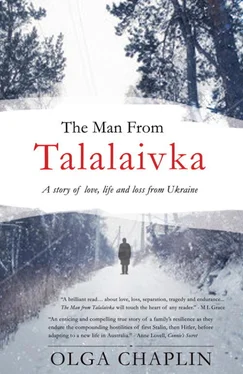Solzhenitsyn’s accounts of the gulags were but rumoured, still to be revealed. But the anecdotal histories of so many like him were already circulating. And no-one was removed from suspicion by the vindictive Stalin. Even the brilliant Marshal Zhukov, saviour of many battles and thus of so many Russian and Ukrainian lives, barely escaped trumped-up ‘non-patriotism’ charges, with only his supreme popularity halting Stalin from carrying out his threats. Peter knew he had no choice but to do whatever he could to protect his family, in order to escape their inevitable fate if returned to Soviet soil.
“Herr Pospile… I see your Red Cross cards issued by the Geneva office, dated 28th July, 1945, indicates you are Ukrainian, and ‘stateless’.” Peter nodded. The officer put the document to one side, picked up another. “Then these documents… in Wilhelmshaven, dated 15th October, 1945, indicate you and your wife Evdokia came from Mirohoshtcha, Polish-Ukraine. Is that so?” He watched Peter carefully, his expression neutral, listened impassively to his explanation.
“So… your village was within the border of Poland?… But you are Orthodox, Ukrainian… And so you must be bilingual, then?” Peter affirmed, responded readily in Polish. “Hmm…” the officer paused. He turned thoughtfully to a bound reference, frowning slightly as he searched for the elusive village that may well have been obliterated along with thousands of others in the vast regions of the war.
“And so… you have not practised your veterinary surgeon skills since… your arrival in Germany… at the end of 1943?” His sharp eyes watched Peter’s reaction, ostensibly even more dispassionately. Peter felt a sting of pride testing his pent-up emotions. If this official’s demeanour was intended to unnerve the unwary applicant, he could succeed at any moment. He took a deep breath, responded in a factual manner: their Berlin temporary camp, their many months in the Wilhelmshaven camps, and now the Heidenau camp of the Hamburg region.
His heart sank as he realised that he may never have an opportunity to return to the specialist veterinary skills he had gained all those years ago. It pained him that he could now be judged only on his merits as a wood-cutter, and not on the life he had held so dear as a veterinary practitioner. He swallowed hard, bowed his head, felt the tightening of his throat like a waiting noose. As he looked up, the officer was still watching him, evaluating him. For the first time in this traumatic interview, he sensed a few moments of empathy. “O God!” he thought, unable by this time to second-guess what this meant. He wanted to bare his soul, plead with this man, to be allowed to migrate, out of danger. But he knew that would only arouse even more suspicion, cast doubt on the authenticity of every other part of his story. He could only wait. There was no knowing which way the dice of this interview would fall, for or against his and Evdokia’s fate.
“Hmm…” the officer sat impassively, still in thought. Then suddenly he pushed back his chair. It seemed as if some kind of burden had been lifted from him. “Herr Pospile… you know that Poland now allows its citizens to either return to its new borders, or to nominate to migrate… elsewhere?” Peter nodded. “So… what do you wish to do, Herr Pospile, you and your family?” He noted, calmly, Peter’s response: “Desires to migrate to a ‘friendly’ western country.”
“Ahh…!” the officer breathed easily as he signed his name and dated the document with a controlled flourish. “You understand that this testimony does not give a guarantee of migration? This will be forwarded to other… committees. It can be a long process… very long… you do understand?” Peter nodded. The interview was completed, but he waited respectfully for the officer to stand.
“You know, Herr Pospile,” the officer spoke in a softer tone as he stood to shake Peter’s hand in official manner, “the Russians these days are very ‘generous’ in sending their workers to Poland, to… ‘stabilise’ that country.” He looked quizzically at Peter, with the hint of a smile. “It could well be that the Polish government may not need its citizens to return there, as much now, as previously. But… who knows? Each day brings new developments, surprises, in Europe.”
Even in those last moments of his interview, Peter could not know which way his fate would fall. The officer’s hand was strong, purposeful. The man was taller than Peter had first imagined, his light grey hair confounding his age. “He is a disciplined man,” he thought to himself. “He would almost certainly have served somewhere in Hitler’s regime.” Yet, despite the difficulty of the interview, this official showed no malice, expressed no derision for the exhausted displaced worker in the dilapidated jacket who had sat before him. Whatever his views, Peter thought, he had conducted himself honourably: another German citizen in the Allied zone, conducting himself with dignity in such humiliating circumstances, in his own country, which he still could not claim as his own. In spite of his own personal trauma, Peter felt a surge of compassion for this man who, he felt, could possibly be inwardly as traumatised by the events of the past decade as he and so many others were.
Instinctively, noticing the officer had no watch, Peter dug down deep into his jacket for the only prized possession he had kept from the Red Cross parcels. In broken German, he shyly offered the man his gift, in honour of their meeting of ways. “Ah!” he responded and placed his hand on Peter’s outstretched gift. “There is no need to give me your watch… you may need it, some day. You have earned the right to keep it, Herr Pospile… I am… just doing as I am required, here.” He waited for Peter to put away his watch, then, uncharacteristically, as Peter looked back from the open door, the officer tipped his forehead as if in casual salute. Peter stopped and did likewise. Whatever happened, now, he could not accuse this German administrator of pre-judgment. And, in that sense, it made the potential of rejection more bearable.
Germany’s summer sun flashed in his eyes as he stepped down to the pathway to his barracks block. He half-laughed to himself at the inconsistencies, the vagaries of life, even now, in defeated and peaceful western Germany. In one single facile stroke, he could either be a truly freed man, or yet another statistic in one of Stalin’s labour camps in the growing gulags of Siberia and beyond. Now, he could only hold on to his hope, that fortune would smile on them this one last time, to give his heart the chance to feel real freedom from the anguish he had suffered all these years, freedom to allow his spirit one last chance to rise—soar—again.

Chapter 36
“Come, Dyna, Nadia…! Mykola is already there!” Peter waved his encouragement and squeezed Ola’s hand in jest and grasped abundant berry bushes with blistered fingers, his boots searching leverage in acquiescent undergrowth. His muscles burned, but he forced himself up the steep incline to the hill’s peak. As he stooped to carry Ola for the final ascent, the earthy pungency of crushed moss and autumn’s lingering wildflowers hit his nostrils, sharpening his senses. His body ached, but he felt enlivened, optimistic.
“See, it was quicker this way!” he called, drawing victorious breath. Beyond the ridge the party with its accompanying music was already in full revelry. He paused, contemplating the last tricky steps, then beckoned to Evdokia and Nadia to hurry.
Suddenly the expanding vista of the countryside that had become their world these past four long years in Heidenau opened out to him. Its pristine beauty of forests and ostensible tranquillity pricked his senses anew and revived his spirit. He breathed in its freshness and vibrancy, wondered at the unexpected, unpredictable turn of events. From this vantage point, German soldiers had stood in snowy nights and on exposed warm days, guarding their Heidenau army camp during Hitler’s war, their concrete bunkers providing scant protection from constant Allied bombings that had become a part of their daily survival in those last years of war.
Читать дальше













